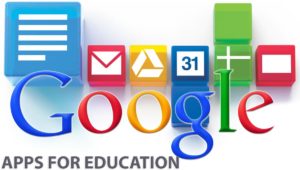 After Columbia’s successful venture into enhanced instructional technology with Google Apps for Education last school year, Goff Middle School is now using the service as well.
After Columbia’s successful venture into enhanced instructional technology with Google Apps for Education last school year, Goff Middle School is now using the service as well.
Students in grades 6-8 will receive their own Google account with limited access and be allowed to email District teachers and students about school-related assignments. They will also have access to Google Calendar, Assignment Tasks, Cloud Document Storage and Docs.
About Google Apps for Education
Google Apps for Education is used by thousands of schools and universities worldwide to make collaboration tools available for students, including email. Google Apps collaboration tools make it possible for students to work together virtually on documents, presentations and projects via the web. Google Apps provide an online storage space for files, eliminating most needs for flash drives between home and school, and also allowing students to electronically submit assignments.
Email accounts are required by many web-based educational tools, and also allow students and teachers to communicate and collaborate in a safe and structured manner with their class. Web-based learning tools provide free access to storytelling, concept mapping, video editing and visual presentation tools.
Acceptable Use
District staff and the Board of Education have carefully considered students’ online safety in establishing the procedures and rules for student accounts. Parents are encouraged to talk with their child about online manners and safety. Throughout the year, your child may have assignments that are completed using tools like Google Docs and Google Sites and will receive instruction from teachers about the Google tool at that time.
Students should consider their school account and email as an extension of the classroom, subject to the same rules of respect and courtesy that we expect in school.
As you talk to your child about the acceptable use of email, you might use an analogy of adults’ work and personal emails. Most employers ask that work email only be used for work, and employers have access to view and limit use of email to make sure it is used appropriately. The same will be true of school email accounts. All school emails are archived and retrievable and are to be used for educational purposes only.
Students will be asked to sign a Digital Social Contract and return it to school before using these services.
Restrictions for Student Google Apps accounts
All student Google App accounts will begin with each student’s expected year of graduation, last name, first two letters of first name and the digit 1 followed by @egcsd.org (e.g., 16smithth1@egcsd.org). We are taking this precaution to protect students from SPAM and from receiving emails from strangers.
Email Filters
School email accounts must comply with the Federal Children’s Internet Protection Act (CIPA). Student emails will be filtered, just as Internet access at school is filtered, to ensure student safety online. Every email sent and received from a school email account (whether from any home, school or public computer or mobile device) goes through filtering software that scans for language and images. Student email addresses will have restrictions on what can be received. East Greenbush uses very powerful filtering tools and makes every effort to block inappropriate content; however, technology is always evolving. If a student receives any inappropriate emails, they should be reported to an adult.
Parents please talk to your children about online manners:
- Politeness Counts. We teach our children to be polite offline; talk to them about being courteous and polite online as well. Texting may seem fast and impersonal, yet simple courtesies like “pls” and “ty” (please and thank you) are common text terms and go a long way toward making text conversations more civil and polite.
- Tone It Down. Using all caps, long rows of exclamation points, or large bolded fonts is the online equivalent of yelling. People don’t appreciate a rant.
- Use Cc: and Reply Allwith care. Suggest that your children resist the temptation to send a message to everyone on their contact list or include more people than appropriate in their communications.
- Avoid Chain Letters. Most chain letters or emails are nuisances at best, and scams at worst. Many carry viruses or spyware. Ask your children not to open or forward them.
Thank you for your support as we work to initiate more collaboration tools for 21st century teaching and learning to our schools. Be on the lookout for a “Google Apps in Education Parent Training” to be held in early November.
